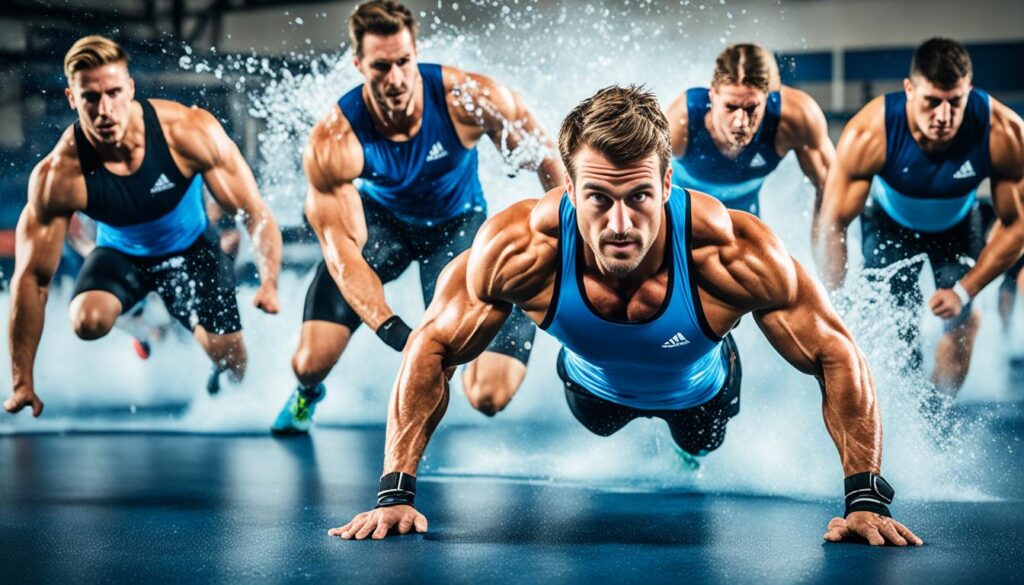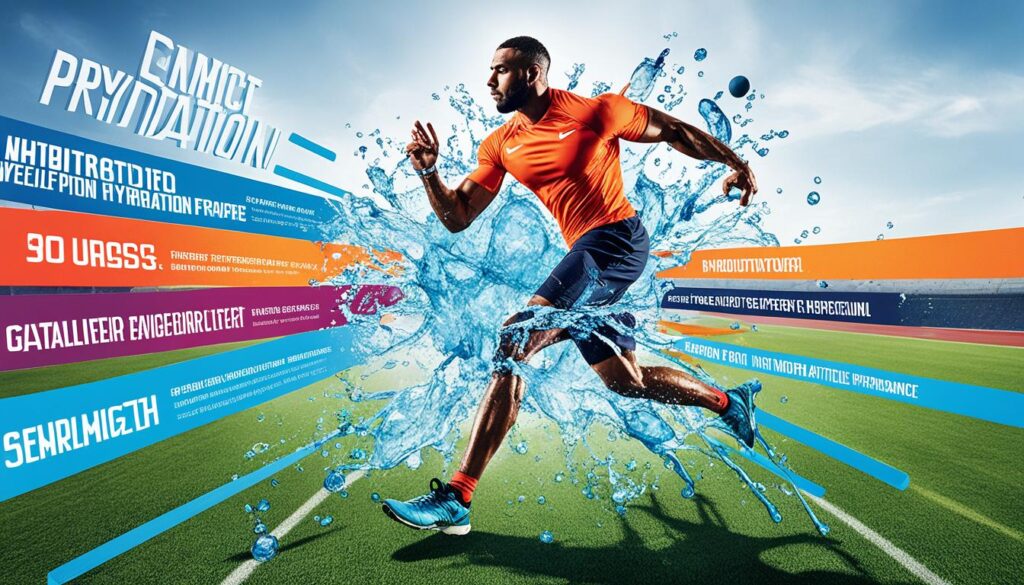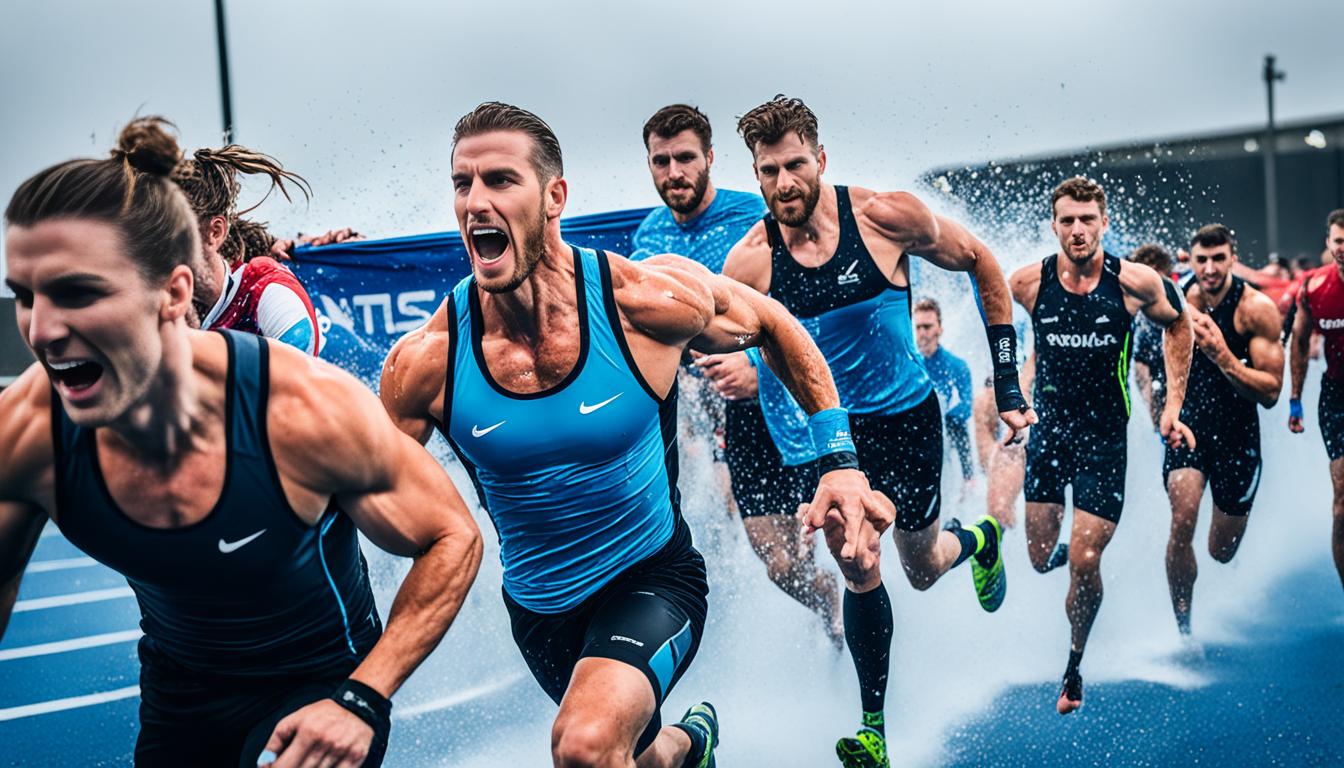Hydration is key for athletes, boosting their performance and preventing injuries. Athletes need to drink enough to keep their bodies working right. This helps them keep their muscles strong and have the power and energy they need.
Staying hydrated is not just good for games but for health all around. It’s vital for thinking sharp and feeling great. Drinking water is a must for any athlete aiming to do their best.
Almost all athletes know that lack of water can hurt how well they play. But, surprisingly, most think that being thirsty means they’re already dehydrated. Fixing this wrong idea is important. It means learning the right amount to drink based on what sports they do and the weather.
At top colleges in the US, some athletes are better at staying hydrated than others. It depends on if they follow special diets. For anyone playing sports, drinking enough before, during, and after is crucial. Not drinking the right amount can weaken muscles, reduce power, and make it harder to last through tough parts of the game.
Key Takeaways
- Proper hydration maintains muscle strength, power, and endurance.
- 97.3% of respondents know dehydration decreases performance.
- 50.5% of respondents incorrectly rely on thirst as a dehydration indicator.
- Fluid intake before, during, and after exercise is essential for optimal performance.
- Dehydration can severely impair athletic performance, including muscle strength and endurance.
Why Hydration is Crucial for Athletes
Hydration is key for athletes’ success. It affects muscle work, keeps blood pressure in check, and helps manage body heat. When athletes drink enough water, they can perform better. This also stops them from getting sick due to heat.
Improved Muscle Function
Staying hydrated is vital for your muscles to work well. With enough water, muscles can function at their best. The NATA found that not drinking enough water can drop muscle strength by 5.5% and lower power by -5.8%. Athletes must drink water to keep performing well.
Regulated Blood Pressure and Circulation
Drinking water also helps keep your heart and blood pressure healthy during exercise. With good hydration, your heart doesn’t have to work too hard. This ensures blood full of oxygen and nutrients reaches your muscles. It also helps in getting rid of waste, which boosts sports performance.
Enhanced Thermoregulation
Proper hydration is important for controlling body temperature. Athletes can sweat a lot, so they should drink regularly. Dehydration messes with the body’s cooling system. This can lead to cramps, heat exhaustion, and even heat stroke. Drinking enough water is crucial to avoid these problems and stay in top shape.
Here is a comparative insight into how different hydration levels impact muscle function:
| Hydration Level | Muscle Strength (% Decrease) | Anaerobic Power (% Decrease) |
|---|---|---|
| Hypohydration | -5.5 ± 1.0% | -5.8 ± 2.3% |
| Proper Hydration | No Significant Decrease | No Significant Decrease |
These numbers show the huge effect of water on muscle work and overall performance. So, athletes should take hydration seriously. Combining proper water intake with good training enhances performance.
The Impact of Hydration on Athletic Performance
It’s key for athletes to know how hydration affects their performance. Being well-hydrated keeps performance levels high in various ways. We’ll look into what’s at stake, the dangers of dehydration, and why recognizing our need for fluids is vital.

Performance Metrics Affected
Dehydration really hits hard on how we perform. It lowers our aerobic endurance, strength, power, and more. When we’re dehydrated ≥ 2%, our endurance performance takes a big hit. Our muscle strength drops, and so does our power. High-intensity endurance also falls significantly. Almost all athletes know that not being well-hydrated hurts how well they perform.
Risks of Dehydration
Dehydration messes with both how we do and our health. It can cause headaches, muscle cramps, and confusion. It can even lead to dangerous issues like heat stroke. Shockingly, most athletes in a big study were dehydrated before even starting practice.
Understanding Fluid Needs
Knowing how much fluid each athlete needs is key. A study found a strong link between not drinking enough and underperforming.
Below is a look at how different diets impact fluid intake:
| Dietary Intention | Fluid Consumption |
|---|---|
| Performance-enhancing diet | Higher fluids intake |
| Less than recommended values | Lower fluids intake |
To wrap up, getting hydration right can stop the negative effects of dehydration. Good hydration practices keep performance and health strong. This is key to stay at your top game.
Hydration Strategies for Optimizing Performance
Understanding and using good hydration strategies are key for top athletic performance. Proper hydration helps athletes stay strong and avoid injuries. It keeps them at their best by maintaining their power and endurance.
Pre-Activity Hydration Tips
Hydrating before any activity is very important. Studies show that 66% of NCAA Division I athletes start their practices dehydrated. They should drink about 500 to 600 ml of water or sports drinks 2 to 3 hours before they work out. This keeps them from getting dehydrated too quickly and helps their muscles work well.
During Activity Hydration Goals
Staying hydrated during exercise is crucial. How much an athlete sweats varies greatly. To stay balanced, fluids should match what’s lost in sweat and urine. It’s critical not to lose more than 2% of your body weight through sweat. Athletes should drink between 14 to 28 ounces of fluids every hour of hard exercise.
Post-Activity Rehydration
Rehydrating after exercise is essential to replace lost fluids. The National Athletic Trainers’ Association suggests drinking 16 to 24 ounces of fluid for every pound lost during exercise. These beverages should have electrolytes. They help muscles recover and your body absorb fluids. This makes sure athletes bounce back quickly and are ready for their next challenge.
| Hydration Phase | Key Recommendations |
|---|---|
| Pre-Activity | Drink 500-600 ml of water or sports drink 2-3 hours before exercise |
| During Activity | Consume 14-28 ounces of fluid per hour |
| Post-Activity | Rehydrate with 16-24 ounces of fluid per pound of weight lost |
Hydration and Different Types of Sports
Hydration needs are different in various sports. This is because athletes face unique physical challenges. Understanding these unique requirements is key to performing well and staying healthy.
Endurance Sports
In endurance sports like marathon running, athletes need to drink water over long periods. Sweating rates are high, ranging from 0.5 to 3.0 liters per hour. This is affected by things like the weather and how hard the athlete is working.
If these athletes lose more than 2% of their body weight through sweat, their performance can suffer. So, they must drink enough water before, during, and after their activities.

High-Intensity Interval Training (HIIT)
HIIT involves intense activity followed by short rests. Hydration is crucial for maintaining performance during such demanding exercises. HIIT can make athletes lose water and electrolytes quickly. This dehydration can reduce strength, power, and endurance. Athletes need to plan their water intake carefully to balance out this rapid sweat loss.
Team Sports
Staying hydrated in team sports poses challenges. This includes sports like soccer, basketball, and football. Athletes have to move fast in short bursts, with brief rest periods in between. It’s important they keep an eye on their water intake and how they feel.
Even with scheduled breaks, many athletes start their activities already needing more water. To stay at their best, they must watch signs like urine color and their body weight. Keeping hydration under a 2% body weight loss limit is crucial for top performance and avoiding injuries.
| Sport Type | Hydration Needs | Performance Impact |
|---|---|---|
| Endurance Sports | High fluid intake due to prolonged activity | Impaired performance with ≥ 2% dehydration |
| HIIT | Regular fluid replacement for high-intensity bursts | Reduced strength, power, and endurance with dehydration |
| Team Sports | Consistent monitoring during stop-start games | Maintaining hydration levels below 2% body weight loss for peak performance |
Understanding how to hydrate properly is crucial in every sport. It helps boost performance, lower injury risk, and keep athletes well.
Signs and Symptoms of Dehydration
It’s crucial for athletes to know the signs of dehydration. They can experience muscle cramps, feel tired, dizzy, or confused. Their mouth might be dry. They could also have a faster heartbeat and difficulty breathing. Watching their urine color is smart. It should be a light straw yellow.
It’s key to recognize these signs fast and drink water. This helps avoid problems like tighter muscles, slower speeds, and weaker muscles. See the table below for a quick guide:
| Indicator | Description |
|---|---|
| Urine Color | Pale straw yellow is ideal, deeper yellow indicates dehydration |
| Muscle Cramping | Caused by a lack of sodium and potassium |
| Fatigue | Common symptom of inadequate fluid replacement |
| Dizziness & Confusion | Due to severely reduced blood volume |
| Dry Mouth | First signs as the body lacks sufficient fluids |
| Increased Heart Rate | Body compensates for low blood volume |
| Reduced Performance | Impacts endurance, strength, speed, and power |
Conclusion
Being properly hydrated is key for top sports performance. It’s vital across all sports to boost how well an athlete performs. It’s important to watch how much each athlete needs to drink and plan well.
Many athletes know dehydration hurts their game. But, over half think thirst tells them they’re dehydrated, which is wrong. This shows we need better ways to keep athletes hydrated.
Even a little dehydration, like losing 2.9% body water, weakens muscles and lowers power. Starting practice dehydrated is common among top athletes, putting them at a disadvantage. Track and field athletes can lose a lot of water fast. This proves the need to manage fluids carefully before, during, and after sports.
Creating a detailed hydration plan supports athletes’ health and performance. Just a 2% water loss can hurt how well you can exercise. It’s vital to watch for signs of dehydration, like weaker muscles and less stamina. This helps athletes stay healthy, lower the chance of getting hurt, and reach their sports goals.




